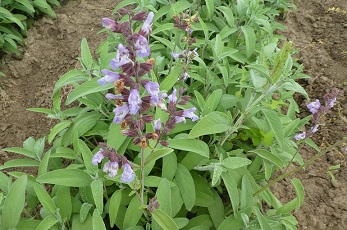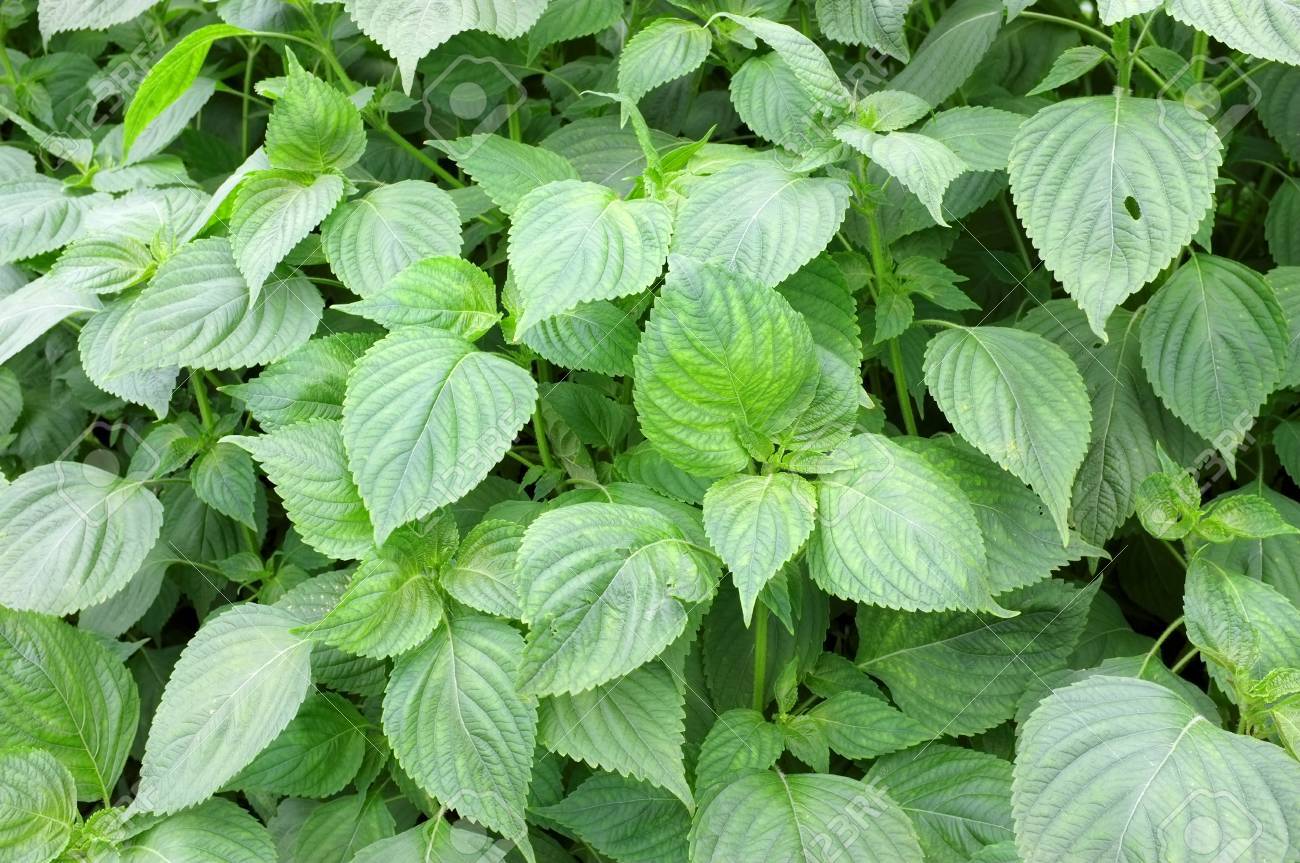Herbs For COVID-19: German Study Shows That Sage And Perilla Infusions Can Function As A Prophylaxis And Also Help Treat SARS-CoV-2 Infections
Source: Herbs For COVID-19 Nov 24, 2020 4 years, 5 months, 2 days, 6 hours, 47 minutes ago
Herbs For COVID-19: German scientists from the Institute for Virology at the University of Duisburg-Essen, Germany have in a new study demonstrated the that potential antiviral effects of commonly consumed Sage and Perilla herbal infusions on the SARS-CoV-2 coronavirus -the pathogen that causes the COVID-19 disease.
 Sage Grown In Phayao, Thailand
Sage Grown In Phayao, Thailand
The present COVID-19 pandemic represents an unprecedented medical and socioeconomic crisis. Highly efficient treatment options preventing morbidity and mortality are not broadly available and approved drugs are hardly affordable in developing countries while themselves not demonstrating real efficacy.
Non-pharmaceutical interventions and antiviral treatments are indispensable to curb the death toll of the pandemic. To identify cost-effective and ubiquitously available options, the study team tested common herbs consumed worldwide as herbal teas.
The study team found that aqueous infusions prepared by boiling leaves of the
Lamiaceae plants perilla and sage elicit potent antiviral activity against SARS-CoV-2 in human cells. Sustained antiviral activity was evident even when cells were treated for only half an hour, and in therapeutic as well as prophylactic regimens.
Considering the dire urgency, such inexpensive and broadly available substances might provide help during the pandemic especially in low-income regions.
The study findings were published on a preprint server and are currently being peer reviewed.
https://www.biorxiv.org/content/10.1101/2020.11.18.388710v1
The edible plant perilla and its variations have a variety of names such as Tía tô (Vietnam), rattlesnake weed (US), silam (India and Nepal), Korean perilla, shiso and egoma (Japan), deulkkae (Korea), zĭsū and sūzǐ (China). In parts of Japan, it is referred to as jūnen (‘ten years’) since it is believed to be able to add ten years to a person's lifespan. In addition to the consumption in herbal teas, certain perilla varieties are used either as spices or in traditional medicine in Southeast Asia. Members of the Lamiaceae family are well described for their medicinal effects against various diseases including pneumonia and cough.
https://pubmed.ncbi.nlm.nih.gov/27890564/
While perilla is very popular in Asia, the related plant sage is more common in Europe and America. The name Salvia officinalis already indicates its medicinal potential since the officinal was a room in a monastery dedicated to herbs and medicine. Sage was also included in the so-called four thieves vinegar which was used in medieval times in attempts to protect users from the plaque. Intriguingly, perilla and sage extracts indeed possess antimicrobial activities.
https://www.ncbi.nlm.nih.gov/pmc/articles/PMC4676988/
https://pubmed.ncbi.nlm.nih.gov/21731448/
&nb
sp;
In the era of modern medicine, some individuals have reservations concerning the use of traditional and herbal medicines. However, a highly relevant fraction of recently approved modern therapeutics directly or indirectly originate from natural products some of which known to and applied by our ancestors. In this respect, the antimalarial lactone Artemisinin derived from the sweet wormwood (Artemisia annua) is amongst the best-known examples.
https://pubmed.ncbi.nlm.nih.gov/27136524/
https://onlinelibrary.wiley.com/doi/abs/10.1002/anie.201601967
https://pubmed.ncbi.nlm.nih.gov/18752857/
Sage has numerous pharmacological and health benefits.
https://www.ncbi.nlm.nih.gov/pmc/articles/PMC4003706/
The antiviral properties of sage are mostly attributed to compounds called safficinolide and sage one, which are found in the leaves and stem of the plant.
https://www.ncbi.nlm.nih.gov/pmc/articles/PMC5634728/
Test-tube research indicates that this herb may fight human immunodeficiency virus type 1 (HIV-1), which can lead to AIDS. In one study, sage extract significantly inhibited HIV activity by preventing the virus from entering target cells.
https://www.ncbi.nlm.nih.gov/pmc/articles/PMC2288616/
Sage has also been shown to combat HSV-1 and Indiana vesiculovirus, which infects farm animals like horses, cows, and pigs.
https://www.tandfonline.com/doi/full/10.1080/10942912.2012.700539
https://agris.fao.org/agris-search/search.do?recordID=RS2009001364
Sage has a variety of antiviral properties.
https://www.tandfonline.com/doi/full/10.1080/10942912.2012.700539
https://www.sciencedirect.com/science/article/pii/S2225411017300056
https://urbigo.me/blog/antiviral-herbs-to-have-close-at-hand-when-the-germs-strike
https://www.ncbi.nlm.nih.gov/pmc/articles/PMC6296812/
The perilla plant also has a variety of phytochemicals with antiviral properties even against influenza, and also against HIV and HCV.
https://www.ncbi.nlm.nih.gov/pmc/articles/PMC6337106/
https://www.ncbi.nlm.nih.gov/pmc/articles/PMC7211506/
https://onlinelibrary.wiley.com/doi/10.1111/jphp.12669
The study team team found that aqueous infusions of sage and perilla elicited potent antiviral activity against the SARS-CoV-2 coronavirus in different human cell lines.
Just after just 30 minutes of treating the cells in both therapeutic and prophylactic regimens, significant antiviral activity was observed.
The study team calls for future clinical studies to investigate whether herbal infusions based on perilla and sage might help to prevent or treat SARS-CoV-2 infection when combined with standard treatments.
Lead researcher and corresponding researcher, Dr Vu Thuy Khanh Le-Trilling a German of Vietnamese origin told Thailand Medical News, "It will be very interesting to identify the compounds responsible for the antiviral activity of aqueous perilla and sage infusions. Given the urgency, such inexpensive and broadly available substances might provide help during the pandemic - especially in low-income regions."
For thousands of years aqueous plant infusions have been used in healing and in traditional medicine across various different cultures to prevent or treat respiratory infections.
The plant members of the Lamiaceae family such as sage (Salvia officinalis) and perilla (Perilla frutescens) are particularly popular herbs used in the preparation of teas.
The study team tested the effects of aqueous infusions of sage and perilla on Vero E6 cells that had been infected with SARS-CoV-2 for one hour.
As a control, the study team included coriander in the experiments, since this herb is not a member of the Lamiaceae family and is not widely used as a medicinal substance.
The herbal infusions were prepared by boiling the plants' leaves and simmering them at a temperature of 60°C for 2 hours.
The study team says this short-term treatment with either herb was enough to release sufficient phytochemicals to inhibit the replication of SARS-CoV-2 significantly.
The study team next treated infected cells using two different doses of the virus and visualized them using immunofluorescence microscopy.
Significantly, the number of infected cells was clearly reduced following treatment, even when a high viral dose (0.5 plaque-forming units [PFU] per cell) was used.
 Perilla Bushes In Phayao, Thailand
Perilla Bushes In Phayao, Thailand
As the plant components were extracted by boiling the leaves in water, the team concluded that the antiviral activity is induced by water-soluble heat-stable compound(s).
Hence standard teabags servings may contain sufficient levels of antiviral compound.
The study team say the amount of herbal material that was used to prepare the infusions suggests that a 1/10 dilution of the infusions already matches the concentration of herbal teas prepared from standard tea bags.
The study team said, "This indicates that herbal teas prepared from commercially available tea bags or dried herb leaves might contain a sufficient concentration of the antiviral compounds.”
In order to adapt the experiment to reflect the conditions of tea consumption more realistically, the researchers reduced the treatment time to 30 minutes.
Interestingly a significant reduction in viral replication was still observed following treatment with either herbal infusion.
The team next compared the effects of infusions prepared from fresh and dried leaves.
Interestingly the dried sage leaves retained most of the antiviral activity, says the team. On the other hand, the dried perilla leaves were less effective, although significant inhibition of viral replication was still observed for the 1/10 dilutions.
In order to test whether the herbs might elicit prophylactic effects, Vero E6 cells were treated with different dilutions of the herbal infusions for one hour before the herbal components were removed and the cells infected with SARS-CoV-2.
Dr le Trilling added, "By removing the herbal infusions before infection, we aimed to primarily assess antiviral effects based on cellular responses and not on direct virucidal elimination of infectious virus particles."
The study findings of six separate different experiments using two distinct SARS-CoV-2 isolates showed that the infusions significantly reduced infectivity, particularly the perilla infusion.
The study team concluded
, "Perilla and sage teas might not only be suitable for the treatment of SARS-CoV-2 infections but also for prevention of infections.”
Since cells differ in terms of the mode of SARS-CoV-2 entry, the infusions were tested in another cell line called Caco-2.
Even then the study team observed potent inhibition of SARS-CoV-2 replication in cells that had been treated with sage and perilla infusions for one hour.
Detailed visualization of the cells by fluorescence microscopy revealed a clear reduction in the number of cells that had been infected with SARS-CoV-2.
The study team says the findings suggest that the Lamiaceae plants perilla and sage contain water-soluble heat-stable components that induce potent therapeutic and prophylactic antiviral activity against SARS-CoV-2 in different cell lines.
The study team however warned, "Obviously, the consumption of herbal teas cannot and should not replace NPIs or clinically approved drugs. However, given their inexpensive and universal availability, they might contribute to prevent or relieve some of the hardness and suffering of the COVID-19 pandemic.”
One limitations of the study was the limited strains of SARS-CoV-2 virus used as there are now numerous mutated strains emerging that are even resistant to therapeutic compounds.
Thailand Medical News has already been using both herbs in our prophylactic and therapeutic teas against the COVID-19 along with 25 actual herbs and another 14 herbs in which more than 31 pure phytochemicals have been extracted for use in our teas. We have already completed vitro, vivo and safety studies and also observational clinical studies but have yet to proceed on randomized clinical trials and also test our teas against a complete database of 78 main circulating strains of the SARS-CoV-2 and also assess the epigenetic effects of more than 65 identified human host gene variants that effect SARS-CoV-2 severity due to lack of funds. To date we have been self-funding all our research projects as we are based in a “fucked’ country where greed, nepotism, corruption, ego and stupidity is predominant among the local population and we have never got any help for our herbal based projects from any government agencies, corporations etc. To date we have received kind help for one generous local for us to set up our own phytochemical extraction facility and also donation from two readers to the tune of 150 US$ (one from Denmark for US$100 from and another US$ 50 from America,) out of the millions of readers that we have!
https://www.thailandmedical.news/news/new-therapeutic-teas-
Herbs, phytochemicals and natural compounds will ultimately be the answer to stopping the COVID-19 pandemic, not overpriced toxic drugs and therapeutics that are not properly tested and could give rise to antibody resistance or worse antibody-dependent enhancement (ADE).
Let’s pray that the COVID-19 crisis gets worse and more people get infected and die, preferably such that every rich or middle class family loses a love one to COVID-19, then only and maybe most of the selfish, stupid and ignorant people out there will respond to our calls for help and support Herb research and free dissemination of such therapeutics for the masses.
For more on
Herbs For COVID-19, keep on logging to Thailand Medical News.
If there are any decent, kind and generous people who wish to support our site and also our research initiatives, help by making a donation.
https://www.thailandmedical.news/p/sponsorship

